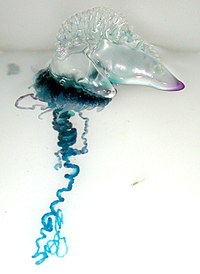
Photo from wikipedia
BACKGROUND Reduction mammaplasty is an effective and safe treatment option for adults with symptomatic macromastia, but there is less data regarding outcomes in adolescents. OBJECTIVES The purpose of this study… Click to show full abstract
BACKGROUND Reduction mammaplasty is an effective and safe treatment option for adults with symptomatic macromastia, but there is less data regarding outcomes in adolescents. OBJECTIVES The purpose of this study is to determine the short-term psychosocial impact, satisfaction, and safety of reduction mammaplasty when performed during adolescence. METHODS A retrospective review was performed of a single pediatric plastic surgeon's experience with reduction mammaplasty from 2018 to 2021 in patients ≤ 18. Patients completed the preoperative and postoperative "Satisfaction with Breasts" and "Psychosocial Well-Being" sections of the BREAST-Q Survey. Clinical variables gathered included age, weight, BMI, complication profile, specimen resection weight, and follow-up duration. RESULTS 41 patients met inclusion criteria. The mean converted Rasch scores for BREAST-Q "Satisfaction with Breasts" and "Psychosocial Well-Being" increased significantly following reduction mammaplasty (Satisfaction with Breasts, Preop: 24.1 vs. Postop: 92.6; Psychosocial Well-Being, Preop: 37.7 vs. Postop: 90.4, p < 0.001). Obesity (BMI ≥ 30 kg/m2) was associated with lower preoperative "Psychosocial Well-Being" scores (Obese: 29.7 vs. Non-obese: 43.3, p < 0.001) but a greater improvement in score following surgery (Obese: + 63.9 vs. Non-obese: + 44.9, p < 0.001). Specimen weight ≥ 1,000 grams was also associated with greater improvement in score on the "Psychosocial Well-Being" section (≥ 1,000 grams: + 58 vs. < 1,000 grams: + 49.7, p = 0.046). Overall complication rate was 31.7% while the major complication rate was 2.4%. Mean specimen resection weight was higher in patients who experienced complications (1141.3 grams vs. 836.8 grams, p = .008). CONCLUSIONS Reduction mammaplasty during adolescence predictably improves both short-term satisfaction with breasts and psychosocial well-being while demonstrating a favorable short-term complication profile.
Journal Title: Aesthetic surgery journal
Year Published: 2023
Link to full text (if available)
Share on Social Media: Sign Up to like & get
recommendations!